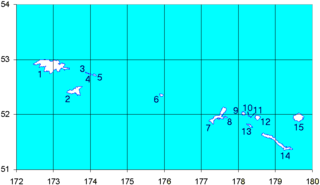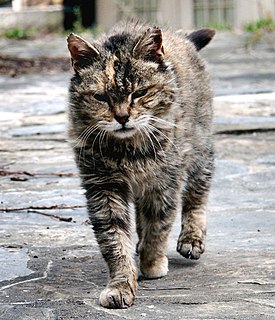Rat poison is a pest control chemical for killing rodents.
Rat poison may also refer to:
- ratpoison, a computer program
- Rat Poison, a remix of "Poison" (The Prodigy song)
Rat poison is a pest control chemical for killing rodents.
Rat poison may also refer to:

Rats are various medium-sized, long-tailed rodents. Species of rats are found throughout the order Rodentia, but stereotypical rats are found in the genus Rattus. Other rat genera include Neotoma, Bandicota and Dipodomys.

The black rat, also known as the roof rat, ship rat, or house rat, is a common long-tailed rodent of the stereotypical rat genus Rattus, in the subfamily Murinae. It likely originated in the Indian subcontinent, but is now found worldwide.

Ouabain or also known as g-strophanthin, is a plant derived toxic substance that was traditionally used as an arrow poison in eastern Africa for both hunting and warfare. Ouabain is a cardiac glycoside and in lower doses, can be used medically to treat hypotension and some arrhythmias. It acts by inhibiting the Na/K-ATPase, also known as the sodium-potassium ion pump. However, adaptations to the alpha-subunit of the Na+/K+-ATPase via amino acid substitutions, have been observed in certain species, namely some herbivore- insect species, that have resulted in toxin resistance.

Rodenticides are chemicals made and sold for the purpose of killing rodents. While commonly referred to as "rat poison", rodenticides are also used to kill mice, squirrels, woodchucks, chipmunks, porcupines, nutria, beavers, and voles.

The maned rat or (African) crested rat is a nocturnal, long-haired and bushy-tailed East African rodent that superficially resembles a porcupine. The world's only poisonous rodent, the maned rat borrows toxins from plants to fend off predators.

A rat-catcher is a person who practices rat-catching as a professional form of pest control.

Aminopterin, the 4-amino derivative of folic acid, is an antineoplastic drug with immunosuppressive properties often used in chemotherapy. Aminopterin is a synthetic derivative of pterin. Aminopterin works as an enzyme inhibitor by competing for the folate binding site of the enzyme dihydrofolate reductase. Its binding affinity for dihydrofolate reductase effectively blocks tetrahydrofolate synthesis. This results in the depletion of nucleotide precursors and inhibition of DNA, RNA, and protein synthesis.

Hawadax Island is an island in the Rat Islands archipelago of the western Aleutian Islands in the U.S. state of Alaska. The island was formerly known as Rat Island until May 2012 when it was renamed Hawadax Island, which is an Aleut name meaning "entry" and "welcome". The island has a land area of 10.3126 sq mi (26.7095 km²) and no permanent population. It is within the Alaska Maritime National Wildlife Refuge. It is 9.3 miles (15 km) in length and 3.1 miles (5 km) in width.

The farm cat, also known as a barn cat, is a domestic cat, usually of mixed breed, that lives primarily outdoors, in a feral or semi-feral condition on agricultural properties, usually sheltering in outbuildings. They eat assorted vermin such as rodents and other small animals that live in or around outbuildings and farm fields. The need for the farm cat may have been the original reason cats were domesticated, to keep rodents from consuming or contaminating grain crops stored for later human consumption. They are still commonly kept for their effectiveness at controlling undesired vermin found on farms, ranches, greenhouses, and even drug farms, which would otherwise eat or contaminate crops, especially grain or feed stocks. Farm cats hunt the initial rodent population, and their pheromones keep further rodents from filling the void.

"Poison" is a song by English electronic music group the Prodigy, released on 6 March 1995 as the fourth and final single from their second studio album, Music for the Jilted Generation (1994). Maxim Reality sings on this track.
A rat trap is a trap designed to catch rats. Designs are often larger variations on mousetraps.

Tetramethylenedisulfotetramine (TETS) is an organic compound used as a rodenticide. It is an odorless, tasteless white powder that is slightly soluble in water, DMSO and acetone, and insoluble in methanol and ethanol. It is a sulfamide derivative. It can be synthesized by reacting sulfamide with formaldehyde under acidic condition. When crystallized from acetone, it forms cubic crystals with a melting point of 255–260 °C.
"Alone I Break" is a song written and recorded by the American nu metal band Korn for their fifth studio album Untouchables. It was released as the album's third single in November 2002.
Thallium poisoning is poisoning that is due to thallium and its compounds, which are often highly toxic. Contact with skin is dangerous and adequate ventilation should be provided when melting this metal. Many thallium compounds are highly soluble in water and are readily absorbed through the skin. Exposure to them should not exceed 0.1 mg per m2 of skin in an 8 hour time-weighted average. Thallium is a suspected human carcinogen.
"Eater" is the fifth episode of the NBC horror anthology Fear Itself and is based on the Peter Crowther short story of the same name.
Robert John Lulham was an Australian rugby league footballer who played in the 1940s and 1950s. An Australia international and New South Wales state representative three-quarter back, he played in Sydney for the Balmain club, with whom he won the 1947 NSWRFL Premiership.
A laboratory rat is a rat of the species Rattus norvegicus which is bred and kept for scientific research.

α-Naphthylthiourea (ANTU) is an organosulfur compound with the formula C10H7NHC(S)NH2. This a white, crystalline powder although commercial samples may be off-white. It is used as a rodenticide and as such is fairly toxic. Naphthylthiourea is available as 10% active baits in suitable protein- or carbohydrate-rich materials and as a 20% tracking powder.

Rats in New York City are widespread, as they are in many densely populated areas. For a long time, the number of rats in New York City was unknown, and a common urban legend declared there were up to five times as many rats as people. In 2014, however, scientists more accurately measured the entire city's rat population to be approximately only 24% of the number of humans. That would equate to approximately 2 million rats to New York's 8.4 million people at the time of the study.

d-CON is an American brand of rodent control products owned and distributed in the United States by the UK-based consumer goods company Reckitt. The d-CON product line includes traps and baits for use around the home for trapping and killing rats and mice. As of 2015, bait products use first-generation vitamin K anticoagulants as poison.